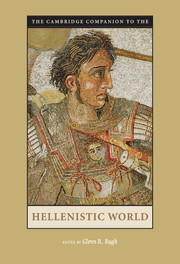Book contents
- Frontmatter
- Introduction
- 1 Alexander the Great and the Creation of the Hellenistic Age
- 2 The Hellenistic Kingdoms
- 3 The Polis and Federalism
- 4 Hellenistic Economies
- 5 The Hellenistic Family
- 6 History and Rhetoric
- 7 Material Culture
- 8 Hellenistic Art: Two Dozen Innovations
- 9 Language and Literature
- 10 Greek Religion: Continuity and Change in the Hellenistic Period
- 11 Philosophy for Life
- 12 Science, Medicine, and Technology
- 13 Hellenistic Military Developments
- 14 Greeks and Non-Greeks
- 15 Recent Trends and New Directions
- Hellenistic Dynasties
- Works Cited
- Index
Introduction
Published online by Cambridge University Press: 28 November 2007
- Frontmatter
- Introduction
- 1 Alexander the Great and the Creation of the Hellenistic Age
- 2 The Hellenistic Kingdoms
- 3 The Polis and Federalism
- 4 Hellenistic Economies
- 5 The Hellenistic Family
- 6 History and Rhetoric
- 7 Material Culture
- 8 Hellenistic Art: Two Dozen Innovations
- 9 Language and Literature
- 10 Greek Religion: Continuity and Change in the Hellenistic Period
- 11 Philosophy for Life
- 12 Science, Medicine, and Technology
- 13 Hellenistic Military Developments
- 14 Greeks and Non-Greeks
- 15 Recent Trends and New Directions
- Hellenistic Dynasties
- Works Cited
- Index
Summary
In 1836, the German scholar J. G. Droysen coined a new term in his three-volume history of the period from the time of Alexander the Great to the coming of Christianity, Geschichte des Hellenismus. Because the German word Hellenismus cannot be translated into English as “Hellenism” (which has a different meaning), it has become customary to apply its adjectival form ”Hellenistic” to this period. For Droysen, Hellenismus signified a fusion of Greek and Eastern cultures that supplied the fertile soil from which Christianity emerged. It was a grand and formative period leading to a revolutionary universal religion. However, over the intervening 170 years or so, Droysen’s positivist outlook did not win over many academics, who continued to view the Classical period of the fifth and fourth centuries as the “golden age” of Greek achievement. Much of the literature produced after Alexander the Great (d. 323) was dismissed as derivative, decadent, and quite frankly, inferior. The scholars of the great Library of Hellenistic Alexandria must accept some blame for this. They are credited with compiling canonical lists of the “greats” in various literary genres, all of whom lived in the Archaic or Classical periods, and these “best” works were more likely to be copied (and thus survive) and to form the basis of the educational curriculum in antiquity and beyond. Who could presume to compete with the masters? A quick glance at Green (1990) attests the enduring power of this negative legacy.
- Type
- Chapter
- Information
- The Cambridge Companion to the Hellenistic World , pp. 1 - 8Publisher: Cambridge University PressPrint publication year: 2006
- 4
- Cited by

